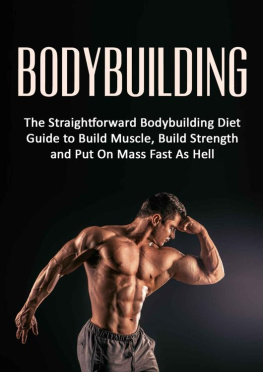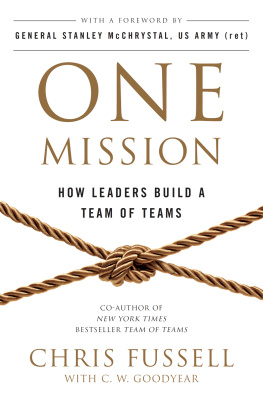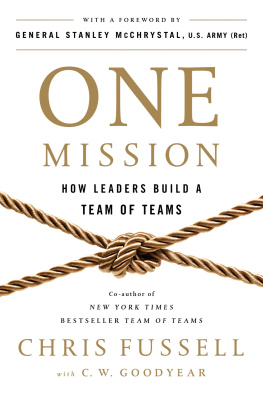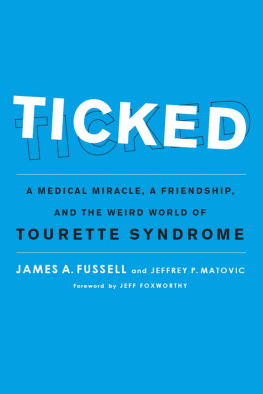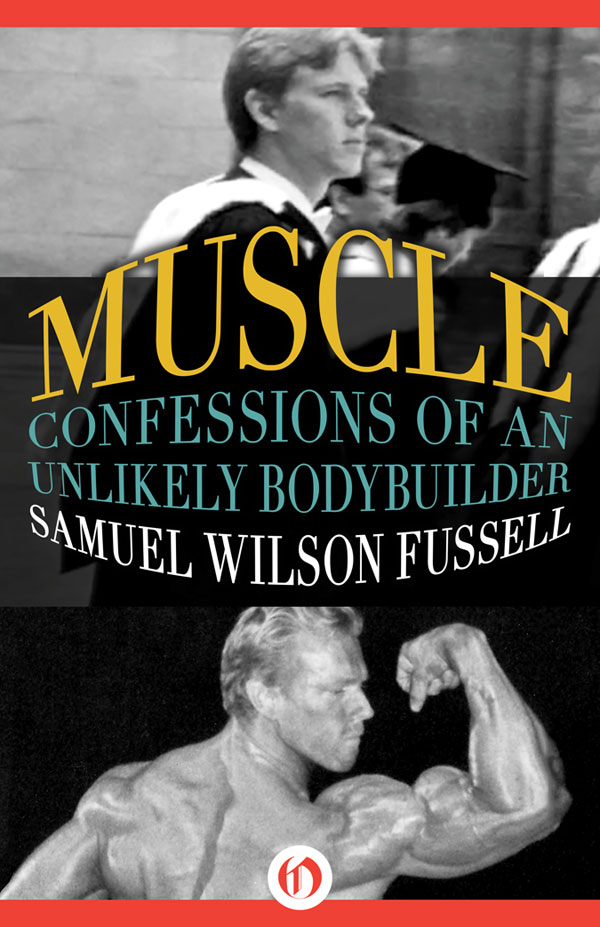Muscle
Confessions of an Unlikely Bodybuilder
Samuel Wilson Fussell

All rights reserved, including without limitation the right to reproduce this book or any portion thereof in any form or by any means, whether electronic or mechanical, now known or hereinafter invented, without the express written permission of the publisher.
Copyright 1991 by Samuel Wilson Fussell
Cover design by Andy Ross
978-1-5040-0198-4
This edition published in 2015 by Open Road Integrated Media, Inc.
345 Hudson Street
New York, NY 10014
www.openroadmedia.com

To Peter Conrad
CONTENTS
ALTHOUGH THE FOLLOWING ACCOUNT IS TRUE, THE NAMES OF CERTAIN PERSONS AND PLACES HAVE BEEN CHANGED IN THE INTEREST OF PRESERVING THEIR ANONYMITY AND PROTECTING MY OWN LIFE.
S.W.F.
WHEN YOU OPERATE IN AN OVERBUILT METROPOLIS,
YOU HAVE TO HACK YOUR WAY WITH A MEAT AX.
ROBERT MOSES
THE FIRST DUTY IN LIFE IS TO ASSUME A POSE.
WHAT THE SECOND IS, NO ONE HAS YET DISCOVERED.
OSCAR WILDE
THE INTRODUCTION
You spot them on the streets of the city and, increasingly, in the malls and parks of the suburbs. Sometimes they band together. Mostly, they walk alone. Bodybuilders. You know the kind. They strut like no others, holding their elbows wider than their shoulders, legs far apart. I know, I was one of them.
For four long years, I trained four hours a day, six days a week with them. I broke whole wheat bread with them. I filled my body with steroids alongside them. I lived with them. And, finally, I competed on stage against them.
The following is an account of my journeywhat I did, what I saw, what I felt. Those in search of a steroid primer or an exercise manual are advised to look elsewhere; my purpose is different. Part ditty, part dirge, I sing of arms and the man, of weight rooms and muscle pits, of biceps and triceps, bench presses and low pulley rows, of young and old, woman and man, straining and hoisting iron to the boom box sound of Top 40 record stations in bodybuilding gyms across the land.
I sing of dreamers and addicts, rogues and visionaries. And I sing of my own solitary pilgrimage into this strange world. A world filled with wrist straps and ammonia, BIG Chewables and the juice. A world governed by a savage force that swallowed me whole from a bookstore in New York City, and did not relent until it had chewed me up and spit me out 80 pounds heavier and 3,000 miles later on a posing dais in Burbank, California. I was swabbed in posing oil and competition color, flexing with all my might, when I came to, a sadder and wiser man.
1. THE GENESIS
ALL THE UNHAPPINESS OF MAN STEMS FROM ONE THING ONLY:
THAT HE IS INCAPABLE OF STAYING QUIETLY IN HIS ROOM.
PASCAL
Bodybuilders call it the disease. Its symptoms include a complete commitment to all matters pertaining to iron. Not the kind of iron you use to press your clothes, but the kind they use to create bulges and muscular mounds in their bodies. You find the diseased in bookstores hovering by the rack containing the muscle magazines (invariably adjacent to the pornography). You overhear them in vitamin stores, discussing the merits of branch-chain amino acids and protein powders. You scan them on the subway, their hypertrophied bodies a silent, raging scream of dissent. And, walking to work in the morning, you can see them through the windows of their gyms, hoisting and heaving weights in a lifting frenzy.
Most of them catch the disease during the years of adolescence. On the back pages of comic books, scrawny teens find advertisements for chest expanders and chin-up bars. For many thats where the affair ends: in an unmailed letter or as cobwebbed, unused equipment piled in the basement. But for a fewthe truly afflictedthe arrival of the equipment is just the beginning. Within a matter of months, they graduate from chest expanders to bench presses, from pull-ups to squats. Eventually, as their bodies fill out and the dream takes hold, they gravitate from distant neighborhoods to their own kind in the gyms of the city.
This was not my story. I passed into my mid-twenties knowing nothing of the disease. Until the age of twenty-six, in fact, my life was filled with books. I began my course of reading at a prep school called Lawrenceville and continued it through my graduation from Oxford University. Until then, everything was set. The son of two university professors of English, I was next in line to assume the academic mantle. My parents only cause for concern was the fact that I preferred American literature to English.
The trouble began when I moved back to New York City for a year off after Oxford before I was to enter graduate school. Within a month I found a sublet on the Upper East Side and a job in publishing. But suddenly and spectacularly my health began to deteriorate. First it was my lungs (the doctors diagnosed pleurisy), then it was a fever (this time, pneumonia). Despite medications, my condition did not improve. Colds, hot flashes, chillsone malady replaced another.
My arrival at work every morning set off a communal buzz of concern. At six feet four and 170 pounds sopping wet, I had always been gaunt. But now, with rasping lungs and cadaverous complexion, I looked like an outpatient from Bellevue (which, in fact, I was). I publicly tried to pass off my predicament as nothing seriousI was just feeling a little under the weather, I said. Things would take a turn for the better come spring, I was sure of it.
And my friends averred that this must be the case. They took me out to lunch and tried to take my mind off my health. But all along, I knew the cause of my own particular disorder, I was just loath to admit it. The problem, you see, was New York. It terrified me. To divulge my fears seemed cowardly, somehow unworthy of the city. But finally, among the lunch gathering, bracketed by a coughing fit, I let it all out. Was I the only one, I asked haltingly, living in a constant state of terror in the city? Did others also find themselves under siege?
As soon as I admitted it, the facts and figures came tumbling out of my mouth. The rapes, the muggings, the assaults, the murders. Those were the majors, but the minors were just as bad. I felt trapped by the teeming populace, dwarfed by skyscrapers, suffocated by the fumes from factories and expressways. And then there was Jerry, and men like him.
Jerry? they asked.
I was surprised they didnt know him. He seemed to be on a first name basis with much of the city.
Hi, Jews for Jesus! Jerry herethats with a J ! he would shout, as soon as he spotted my head on the subway escalator each morning at Grand Central. Sandwich board and all, he waited for me at the top of the platform, plucking me out from the hundreds of other commuters fore and aft.
How ya doin, Stretch? hed begin, all smiles and concern, draping an arm around my shoulder. And then, in an abrupt change of tone, hed pounce: What I mean to say is how do you feel about tomorrow?
I explained to growing laughter around the table that Jerry was just one of many friends drawn to me through the course of the day like slivers of steel to a magnet. Something about me seemed to appeal to every deadbeat, con artist, and self-proclaimed philosopher of the city. No matter where I turned, confidence tricksters hounded my path.
At the conclusion of my painful monologue, I sat back exhausted, shamed that I was so vulnerable. And then, suddenly, merry voices chimed in from all sides at the table. Apparently, Id struck a chord after all. There was Niels, who exulted in the fact that his wet, limp clothes had been scattered across the laundromat floor by a street tough when he hadnt removed them from the washer on time. There was Matthew, rocking in his chair in delight, as he told us of the gray-suited man who followed him home one day, lowered his trousers on Matthews doorstep in mid-afternoon, and defecated on his welcome mat. Troopers together, everyone seemed to have their stories to tell.



